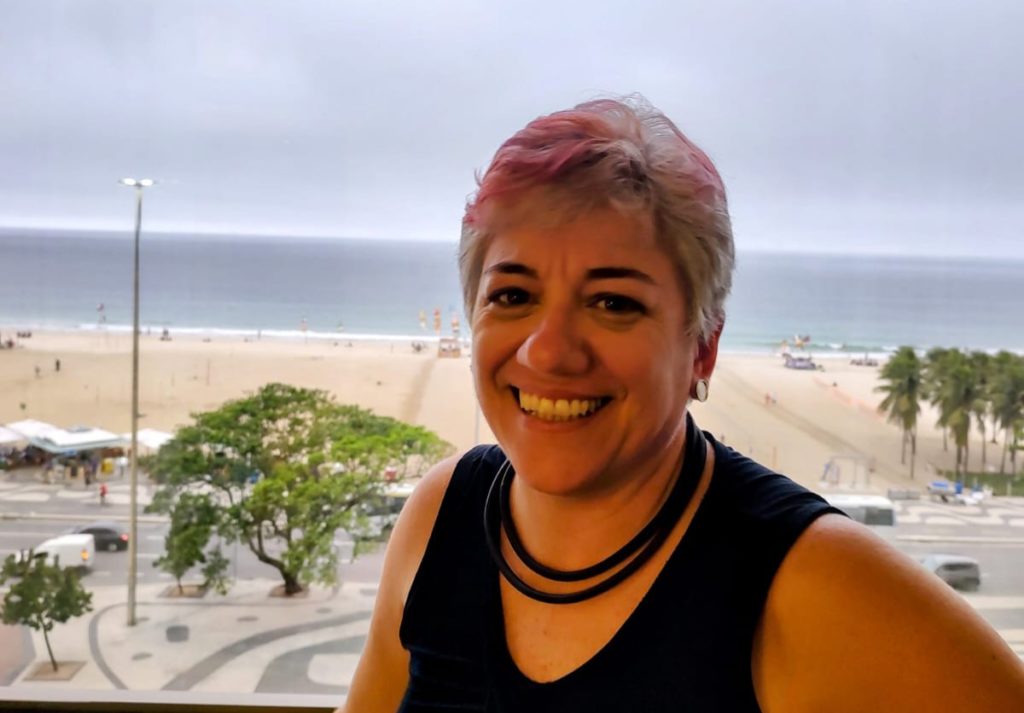São Paulo – Simone Yunes was raised by her paternal grandparents Wady Yunes and Henry Yunes, who actually liked to be called Dona Ida. The assistant manager of CineSesc was one of the founders of the Arab World Film Festival and inherited her Lebanese origins and influences from her grandparents. “My grandfather came from Lebanon when he was 16, and my grandmother’s family was also from Lebanon. I was mostly raised by them. I had a very strong connection with my grandfather, so much that I didn’t want to change my last name when I got married. And I managed to pass the last name to my children, too,” she said.
The contact made her develop a taste for the Lebanese cuisine. “My favorite foods are Arab. I’d eat grape leaves every day if I could. And I cook Arab foods often. As for my father, he really loved rice and beans,” she pointed out, regretting that she didn’t learn the language. “It’s a shame, but he didn’t have the habit [to speak Arabic] at home,” she said.
From her family, she also got her perception of a welcoming ancestry. “My grandfather in particular was a very sweet person. My father has always been an extremely feminist man, and he even gave me my name because of Simone de Beauvoir. I came from a family that was very caring and concerned about culture. My place in the Arab culture comes from this affection and the respect for women. I’d like that every time people thing about the Arabs, it’s from that place,” she pointed out.
The cinema
Yunes holds a degree in Public Relations and a major in Art History. Early in her career, she taught at children’s schools, but in 1996 she started working at the Social Service of Commerce (Sesc). “I worked for four years at Sesc Pompeia, then I came here [CineSesc] in 2000 and ended up working directly with cinema,” she revealed.
At CineSesc, Yune received Soraya Smaili for a meeting that would give rise to the Arab World Film Festival. “At first, there was no curator, so we traveled around and focused on watching Arab movies and researching, and I was closely involved in the curatorship for years. Then came Geraldo [Campos], who’s a very interesting curator, and now Arthur Jafet. I remember [the story of the event] very fondly as it started without support, on our willpower alone,” she pointed out.
This year, the festival reached its 17th edition and resumed in-person screenings that had been discontinued at the beginning of the pandemic in 2020. During the pandemic, the event took place only online. “It’s very important to think about the place of the Arab cinema as it’s a very ancient, relevant culture. It’s very important to think on women and bring female filmmakers. The festival started with two women. Here lies the importance of thinking this plurality and even the issue of Palestine, which is very dear to us,” she stressed.
Here’s more on this:
Although the movies were originally planned for the big screen, the online screenings made it possible that more people had access to the Arab films. “The demand and interest were a pleasant surprise for us. Many film buffs who had known the festival since the start were also interested in watching. This led us to mark our spot at the cultural agenda,” said the manager of CineSesc.
Yunes explains that the team seeks to include films related to the Arab world in the cinema program throughout the year. “We plan this periodicity to create a regard [on the Arab culture] beyond the festival. We are a team made up basically only by women. We have nothing against men, but this has been an encouragement. It’s not about individual projects but the collective. Everyone gets together. We always aim to have our own regard in the curatorship,” she explained.
Plans
Her and her team’s daily work include researching and accompanying festivals and premieres to update the program of Sesc both in movie theaters and in digital and internal projects. This is the work she plans on keeping pursuing. “I want to continue at CineSesc. Sometimes, when I reflect on that, I go to the projection booth, and I think, ‘This is where I belong, and that’s great.’ We also have plans for festivals we’d like to hold,” she said.
She’d also like to visit an Arab country. “I’d like to visit Lebanon,” she said. This is one of her major wishes. “My biggest plan is that Brazil keeps living a future of democracy. I’m very worried as a woman and a person that works with culture. During the dictatorship, my cousin was arrested. So, I’m very moved about all this. I have a 19-year-old son that just got into college and a younger son that I’d like to see the future of a better country,” she said.
Translated by Guilherme Miranda




